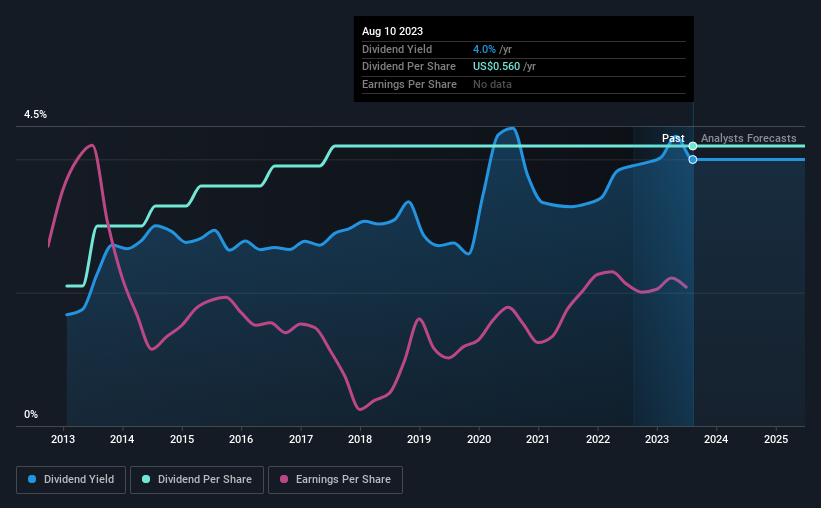Provident Financial Holdings, Inc. (NASDAQ:PROV) Passed Our Checks, And It's About To Pay A US$0.14 Dividend
Regular readers will know that we love our dividends at Simply Wall St, which is why it's exciting to see Provident Financial Holdings, Inc. (NASDAQ:PROV) is about to trade ex-dividend in the next four days. The ex-dividend date is one business day before a company's record date, which is the date on which the company determines which shareholders are entitled to receive a dividend. The ex-dividend date is important because any transaction on a stock needs to have been settled before the record date in order to be eligible for a dividend. Thus, you can purchase Provident Financial Holdings' shares before the 16th of August in order to receive the dividend, which the company will pay on the 7th of September.
The company's next dividend payment will be US$0.14 per share. Last year, in total, the company distributed US$0.56 to shareholders. Calculating the last year's worth of payments shows that Provident Financial Holdings has a trailing yield of 4.0% on the current share price of $14.01. If you buy this business for its dividend, you should have an idea of whether Provident Financial Holdings's dividend is reliable and sustainable. As a result, readers should always check whether Provident Financial Holdings has been able to grow its dividends, or if the dividend might be cut.
See our latest analysis for Provident Financial Holdings
Dividends are usually paid out of company profits, so if a company pays out more than it earned then its dividend is usually at greater risk of being cut. That's why it's good to see Provident Financial Holdings paying out a modest 47% of its earnings.
When a company paid out less in dividends than it earned in profit, this generally suggests its dividend is affordable. The lower the % of its profit that it pays out, the greater the margin of safety for the dividend if the business enters a downturn.
Click here to see the company's payout ratio, plus analyst estimates of its future dividends.
Have Earnings And Dividends Been Growing?
Businesses with strong growth prospects usually make the best dividend payers, because it's easier to grow dividends when earnings per share are improving. If business enters a downturn and the dividend is cut, the company could see its value fall precipitously. It's encouraging to see Provident Financial Holdings has grown its earnings rapidly, up 34% a year for the past five years.
Another key way to measure a company's dividend prospects is by measuring its historical rate of dividend growth. Provident Financial Holdings has delivered an average of 7.2% per year annual increase in its dividend, based on the past 10 years of dividend payments. It's encouraging to see the company lifting dividends while earnings are growing, suggesting at least some corporate interest in rewarding shareholders.
Final Takeaway
Is Provident Financial Holdings an attractive dividend stock, or better left on the shelf? Typically, companies that are growing rapidly and paying out a low fraction of earnings are keeping the profits for reinvestment in the business. This strategy can add significant value to shareholders over the long term - as long as it's done without issuing too many new shares. We think this is a pretty attractive combination, and would be interested in investigating Provident Financial Holdings more closely.
While it's tempting to invest in Provident Financial Holdings for the dividends alone, you should always be mindful of the risks involved. Be aware that Provident Financial Holdings is showing 2 warning signs in our investment analysis, and 1 of those is potentially serious...
A common investing mistake is buying the first interesting stock you see. Here you can find a full list of high-yield dividend stocks.
Have feedback on this article? Concerned about the content? Get in touch with us directly. Alternatively, email editorial-team (at) simplywallst.com.
This article by Simply Wall St is general in nature. We provide commentary based on historical data and analyst forecasts only using an unbiased methodology and our articles are not intended to be financial advice. It does not constitute a recommendation to buy or sell any stock, and does not take account of your objectives, or your financial situation. We aim to bring you long-term focused analysis driven by fundamental data. Note that our analysis may not factor in the latest price-sensitive company announcements or qualitative material. Simply Wall St has no position in any stocks mentioned.

